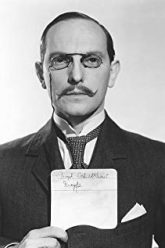Overview
| Born | in Vienna, Austria-Hungary [now Austria] |
| Died | in New York City, New York, USA (heart attack) |
| Nickname | Pepi |
| Height | 5′ 10″ (1,78 m) |
Mini Bio
An imposing Austrian import-turned-matinée idol on the silent screen, Hollywood actor Joseph Schildkraut went on to conquer talking films as well — with Oscar-winning results. Inclined towards smooth, cunning villainy, his Oscar came instead for his sympathetic portrayal of Captain Alfred Dreyfus in La vie d’Emile Zola (1937). His most touching role on both stage and screen would come as the Jewish father-in-hiding, Otto Frank, in Le journal d’Anne Frank (1959).
Born on March 22, 1895, in Vienna, Austria, Joseph was the son of famed European/Yiddish stage actor Rudolph Schildkraut and his wife, the former Erna Weinstein. Nicknamed “Pepi” as a boy, the affectionate tag remained with him throughout his life. The family moved to Hamburg, Germany, when Joseph was 4. Joseph studied the piano and violin and grew inspired with his father’s profession. On stage (with his father) from age 6, the family again relocated to Berlin where his father built a strong association with famed theatrical director Max Reinhardt.
Following Joseph’s graduation from Berlin’s Royal Academy of Music in 1911, the family migrated to America and settled in New York in 1912. His father continued making his mark in America’s Yiddish theater while Joseph was accepted into the American Academy of Dramatic Arts. Offered lucrative theatre work back in Germany, Rudolf and family returned to Europe where Joseph began to grow in stature on the stage with the help of mentor Albert Bassermann. Joseph, like his father, would become well known not only for his prodigious talents on stage, but his marriage-threatening, Lothario-like behavior off-stage.
World War I and a call to the Austrian Army could have interrupted his career but his theatrical connections helped exempt him from duty. A thriving member of the Deutsches Volkstheatre (1913-1920), work became difficult to find in the post-war years so once again the family returned to America in 1920. Now an established stage player, Joseph was handed the title role in the Guild Theatre production (and American premiere) of “Liliom” opposite his leading lady of choice Eva Le Gallienne. It made stars out of both actors and both revisited their parts together on stage many years later in 1932.
Having appeared in a few silent pictures in Germany and Austria, Joseph was handed a prime role in the silent screen classic Les deux orphelines (1921) starring the Gish sisters. This alone established him as an exotic matinée figure along the lines of a Valentino and Navarro. Preferring the stage, he nevertheless continued making films while conquering (on screen) Hollywood’s loveliest of actresses, including Norma Talmadge in Fleur des sables (1923), Seena Owen in Shipwrecked (1926), Marguerite De La Motte in C’était un Prince! (1926), Bessie Love in Young April (1926) (which also co-starred father Rudolf), Lya De Putti in The Heart Thief (1927), and Jetta Goudal in The Forbidden Woman (1927). Most notable was his participation in the Cecil B. DeMille epics L’empreinte du passé (1925) and Le roi des rois (1927), the latter co-starring as Judas Iscariot, with father Rudolf playing the high priest Caiaphas.
Joseph met his first wife, aspiring actress Elise Bartlett, during a herald run as “Peer Gynt” (1923) on Broadway. The impulsive romantic swept her off her feet, proposed to her on the day he met her, and married her the following week. The couple separated a few years later and his first wife fell to drink, dying at a fairly young age of an alcohol-related illness. His second marriage to Marie McKay was much happier and lasted almost three decades.
The actor’s sturdy voice and strong command of the stage led to an easy transition into talking films. Among others, Joseph won the role of Gaylord Ravenal in the Kern and Hammerstein musical Show-Boat (1929) opposite Laura La Plante as Magnolia. Despite his preference for the theater, Depression-era finances forced him to relocate to Los Angeles for more job security. Throughout the 1930s and 1940s, Joseph evolved into one of Hollywood’s most distinctive character actors.
He played Wallace Beery’s nemesis, General Pascal in MGM’s Viva Villa! (1934), King Herod opposite Claudette Colbert in DeMille’s Cléopâtre (1934), and stole scenes as the cunning and underhanded Conrad, Marquis of Montferratin, in DeMille’s Les croisades (1935). Joseph received his Oscar for his portrayal of Captain Dreyfus, a proud and robust French Jew wrongly convicted of treason and subsequently exiled to Devil’s Island, in the biopic La vie d’Emile Zola (1937). He soon became a Hollywood fixture appearing in everything from sumptuous costumers (Marie-Antoinette (1938), Les trois louf’quetaires (1939), L’homme au masque de fer (1939), Le joyeux barbier (1946)), to action adventure (Amour d’espionne (1937), Suez (1938)) to potent drama (La mousson (1939), Rendez-vous (1940)). His film output slowed down considerably at the outbreak of WWII in 1941, however; nevertheless he continued to show vitality on the stage with notable successes in “Clash by Night” (1941) with Tallulah Bankhead, “Uncle Harry” (1942) and “The Cherry Orchard” (1944) (again with Eva Le Gallienne).
His Hollywood downfall happened when he signed his career away to the low budget Republic Pictures studio…for financial reasons. The films were unworthy of his participation and his roles secondary in nature to the storyline. His final Broadway appearance and greatest stage triumph would occur in 1955 as Otto Frank and he repeated his role on film but Le journal d’Anne Frank (1959). In one of Hollywood’s bigger missteps, he was not even nominated for an Academy Award. Sporadic appearances followed on stage and film — his last movie role wasted on the trivial role of Nicodemus in the epic failure La plus grande histoire jamais contée (1965). The film was released posthumously. On TV, however, he played Claudius to Maurice Evans’ Hamlet in 1953 and filmed a memorable “Twilight Zone” episode in 1961.
Following his beloved second wife’s death in 1961, he married one more time, in 1963, to a much younger woman named Leonora Rogers. Joseph died of a heart attack only months later at his New York City home on January 21, 1964, He was 68, almost the exact same age his father Rudolf was when he too suffered a fatal heart attack. Joseph was interred in the Beth Olam Mausoleum of the Hollywood Forever Cemetery in Los Angeles.













